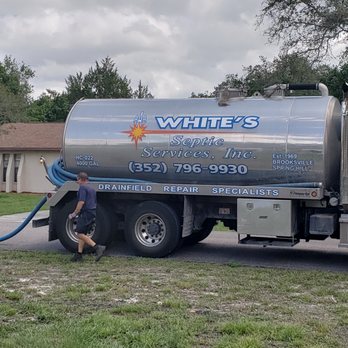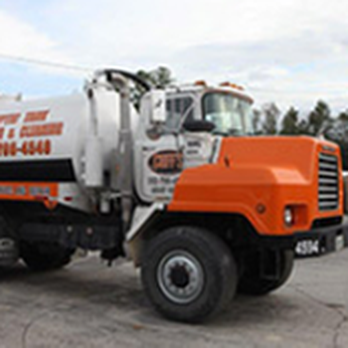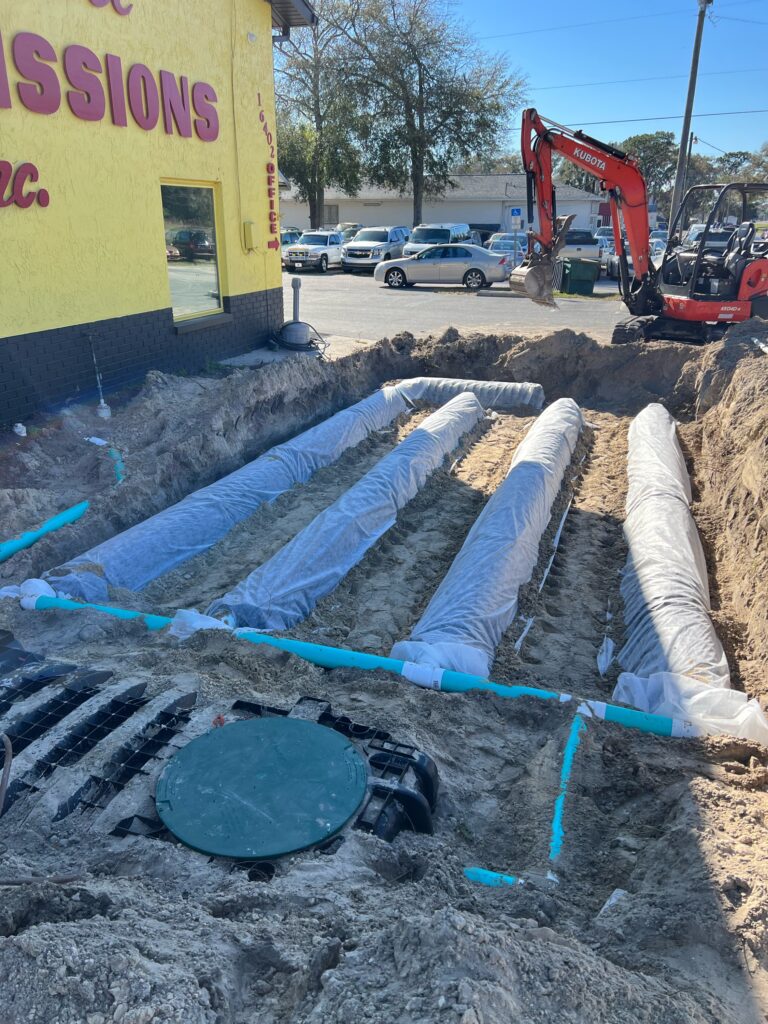In this article, we’re going to discuss the importance of septic tank pumping in Brooksville. You’ll learn why regular pumping is necessary to maintain the functionality of your septic system, as well as the signs that indicate it’s time for a pump-out. We’ll also cover the process of septic tank pumping and provide some tips for finding a reliable pumping service in Brooksville. By the end of this article, you’ll have a better understanding of how to keep your septic system running smoothly and avoid any potential issues down the line.

What is a Septic Tank?
A septic tank is an underground wastewater management system commonly used in rural and suburban areas that are not connected to a centralized sewer system. It is designed to treat and dispose of household sewage on-site. The main purpose of a septic tank is to separate solid waste from the wastewater and allow the liquid to be safely absorbed into the soil through a drain field.
Components of a Septic Tank
A septic tank consists of several components that work together to effectively treat and dispose of sewage. The primary components include:
-
Inlet Pipe: This pipe allows wastewater from the house to flow into the tank.
-
Septic Tank: The septic tank is a watertight container made of concrete, fiberglass, or plastic. It is divided into two compartments with a baffle in between. The first compartment receives the wastewater and allows the solids to settle at the bottom, forming sludge. The liquid, known as effluent, flows into the second compartment.
-
Outlet Pipe: The outlet pipe allows the effluent to flow out of the septic tank and enter the drain field.
-
Drain Field: The drain field is a network of perforated pipes or trenches buried in the soil. The effluent from the septic tank flows into the drain field, where it is further treated and filtered through the soil.
How does a Septic Tank Work?
The functioning of a septic tank is relatively simple. When wastewater enters the tank through the inlet pipe, the heavy solid waste settles at the bottom of the first compartment, forming sludge. Lighter solids, such as grease and oils, float to the top, forming scum. The liquid effluent, which is relatively clear, flows into the second compartment.
As the effluent flows into the drain field, it is distributed evenly through the perforated pipes or trenches. The effluent is then gradually absorbed into the surrounding soil, where natural processes help further treat it by removing harmful bacteria, viruses, and other contaminants.
Signs of a Full Septic Tank
It is essential to be aware of the signs that indicate your septic tank is full and requires pumping. Ignoring these signs can lead to clogs, backups, and even sewage spills, which can be costly and hazardous to your health and the environment. Here are some common signs of a full septic tank:
Slow Draining Fixtures
If your sinks, showers, or toilets are draining slower than usual, it may be a sign that your septic tank is full. As the tank fills up, it can no longer accommodate new wastewater, leading to slow drainage.
Unpleasant Odors
Another sign of a full septic tank is the presence of foul odors around your property. A full tank can cause sewage gases to escape through drains or seep into the ground, creating unpleasant smells.
Sewage Backups
One of the most obvious signs of a full septic tank is sewage backups. If sewage starts to back up into your sinks, showers, or toilets, it is a clear indication that your septic tank is at capacity and needs to be pumped immediately.
Importance of Regular Septic Tank Pumping
Regular septic tank pumping is crucial for maintaining the effectiveness and longevity of your septic system. By removing the accumulated sludge and scum, pumping helps prevent clogs, backups, and other potential issues. Here are some key reasons why regular septic tank pumping is important:
Preventing Clogs and Backups
As the solid waste accumulates in the septic tank, it can eventually lead to clogs in the pipes and cause backups. Regular pumping ensures that the tank stays clear of excess waste, preventing clogs and backups from occurring.
Maintaining System Efficiency
A well-maintained septic system operates more efficiently. Regular pumping helps prevent the buildup of solids that can restrict the flow of wastewater, allowing the system to function properly. This can result in better drainage, reduced odors, and a healthier environment.
Extending the Lifespan of the Septic System
A properly maintained septic system can last for decades. By regularly pumping the tank, you can extend the lifespan of your system and avoid costly repairs or premature replacement. Pumping removes the solids that can cause damage to the drain field or other components of the system if left unchecked.
Frequency of Septic Tank Pumping
The frequency at which you should pump your septic tank depends on several factors, including household size, waste production, and the size of the tank. Here are some considerations to determine the appropriate pumping frequency for your septic system:
Consideration of Household Size
The number of people living in your home directly affects the amount of wastewater produced. A larger household will generate more wastewater, which means the septic tank will fill up more quickly. As a general guideline, a four-person household typically requires septic tank pumping every three to five years.
Type of Waste Produced
Certain activities can have a significant impact on your septic tank’s filling rate. For example, if your household frequently uses a garbage disposal, it can result in more solid waste entering the tank. This can lead to a faster accumulation of sludge and scum, requiring more frequent pumping.
The Size of the Septic Tank
The size of your septic tank also plays a role in determining the pumping frequency. Smaller tanks have less capacity and will fill up faster than larger tanks. If you have a smaller tank, you may need to schedule septic tank pumping more frequently.

Septic Tank Pumping Process
When it’s time to pump your septic tank, it is essential to hire a professional septic tank pumping service. They have the knowledge, experience, and equipment to safely and efficiently remove the accumulated solids and ensure the proper functioning of your septic system. Here is an overview of the septic tank pumping process:
Inspection and Locating the Septic Tank
The pumping service will start by locating the septic tank buried underground. They may use specialized tools or conduct an inspection to determine the exact location of the tank.
Pumping Out the Solid Waste
Once the septic tank is located, the pumping service will use a powerful vacuum truck to remove the solid waste from the tank. The vacuum truck is equipped with a large tank and a suction hose, which is inserted into the tank through an access port.
The pumping service will carefully empty the tank, ensuring that all the accumulated sludge and scum are completely removed. They will also inspect the tank for any signs of damage or potential issues that may require attention.
Cleaning and Maintenance Tips
After pumping out the solid waste, the pumping service may offer additional cleaning and maintenance services to keep your septic system in optimal condition. This may include rinsing the tank with water to remove any remaining debris and inspecting the baffles and pipes for proper functioning.
They may also provide you with essential maintenance tips to help you keep your septic system healthy. These tips may include using septic-safe products, avoiding excessive water usage, and regular inspections.
Choosing a Professional Septic Tank Pumping Service
When it comes to septic tank pumping, it is crucial to hire a professional and reputable pumping service. Here are some key factors to consider when choosing a septic tank pumping service:
Researching Reputable Companies
Take the time to research and identify reputable septic tank pumping companies in your area. Ask for recommendations from friends, family, or neighbors who have had their septic tanks pumped recently. Additionally, read online reviews and check their ratings with local business bureaus.
Checking for Licensing and Certifications
Ensure that the pumping service you choose is licensed and certified to perform septic tank pumping and related services. This will give you peace of mind knowing that they have the necessary expertise and adhere to industry standards.
Reading Customer Reviews
Read customer reviews and testimonials to gauge the overall satisfaction level of previous clients. Positive reviews are a good indication of the pumping service’s professionalism and quality of work.

Benefits of Professional Septic Tank Pumping
Hiring a professional septic tank pumping service offers numerous benefits and ensures the proper maintenance and functioning of your septic system. Here are some advantages of professional septic tank pumping:
Thorough and Efficient Cleaning
Professional pumping services have the knowledge, experience, and equipment to thoroughly and efficiently clean your septic tank. They can remove all the accumulated solids, leaving your septic system in optimal condition.
Proper Disposal of Waste
Professional pumping services ensure that the waste removed from your septic tank is disposed of properly and in compliance with local regulations. They have the required permits and facilities to dispose of the waste in an environmentally responsible manner.
Identification of Potential Issues
During the pumping process, a professional pumping service may identify potential issues or damage to your septic system. They can provide you with a detailed assessment and recommend any necessary repairs or maintenance to prevent further damage.
Cost of Septic Tank Pumping
The cost of septic tank pumping can vary depending on several factors, including the size of the tank, location, accessibility, and the amount of solid waste to be removed. Here are some factors that can affect the cost of septic tank pumping:
Factors Affecting the Cost
-
Tank Size: Larger tanks will generally cost more to pump compared to smaller tanks.
-
Location and Accessibility: The ease of access to your septic tank can impact the cost. If the tank is difficult to reach or requires additional equipment, it may increase the overall cost.
-
Amount of Solid Waste: If your septic tank contains a significant amount of solid waste, it may require more time and effort to pump, resulting in a higher cost.
Getting Cost Estimates
To get an accurate cost estimate for septic tank pumping, it is recommended to contact multiple septic tank pumping services. They can evaluate your specific requirements and provide you with a detailed cost estimate based on the factors mentioned earlier.

Maintaining a Healthy Septic System
In addition to regular septic tank pumping, there are several other measures you can take to maintain a healthy septic system. By following these practices, you can prevent issues and prolong the lifespan of your septic system:
Proper Waste Disposal
Avoid flushing or draining substances that can harm your septic system, such as chemicals, grease, oils, feminine hygiene products, and non-biodegradable items. These can disrupt the natural processes in the tank and lead to clogs or damage the drain field.
Conserving Water
Excessive water usage can overload your septic system and lead to premature fill-up. Practice water conservation by fixing leaks, installing low-flow fixtures, and avoiding unnecessary water usage.
Regular Inspections
Schedule regular inspections by a professional septic service provider. They can assess the condition of your septic system, identify any potential issues, and recommend appropriate maintenance or repairs.
Conclusion
Regular septic tank pumping is essential for maintaining a healthy and efficient septic system. By identifying the signs of a full septic tank and scheduling regular pumpings, you can avoid costly repairs and ensure the longevity of your septic system. Remember to choose a professional septic tank pumping service, consider the frequency of pumping based on household size and waste production, and follow proper maintenance practices for a healthy septic system. With proper care and maintenance, your septic system will continue to operate effectively for many years to come.

